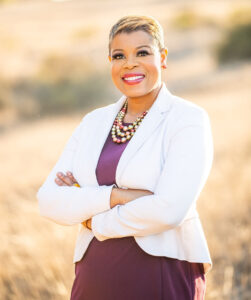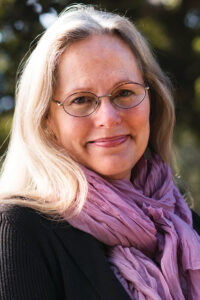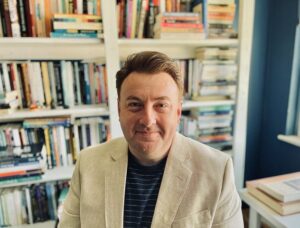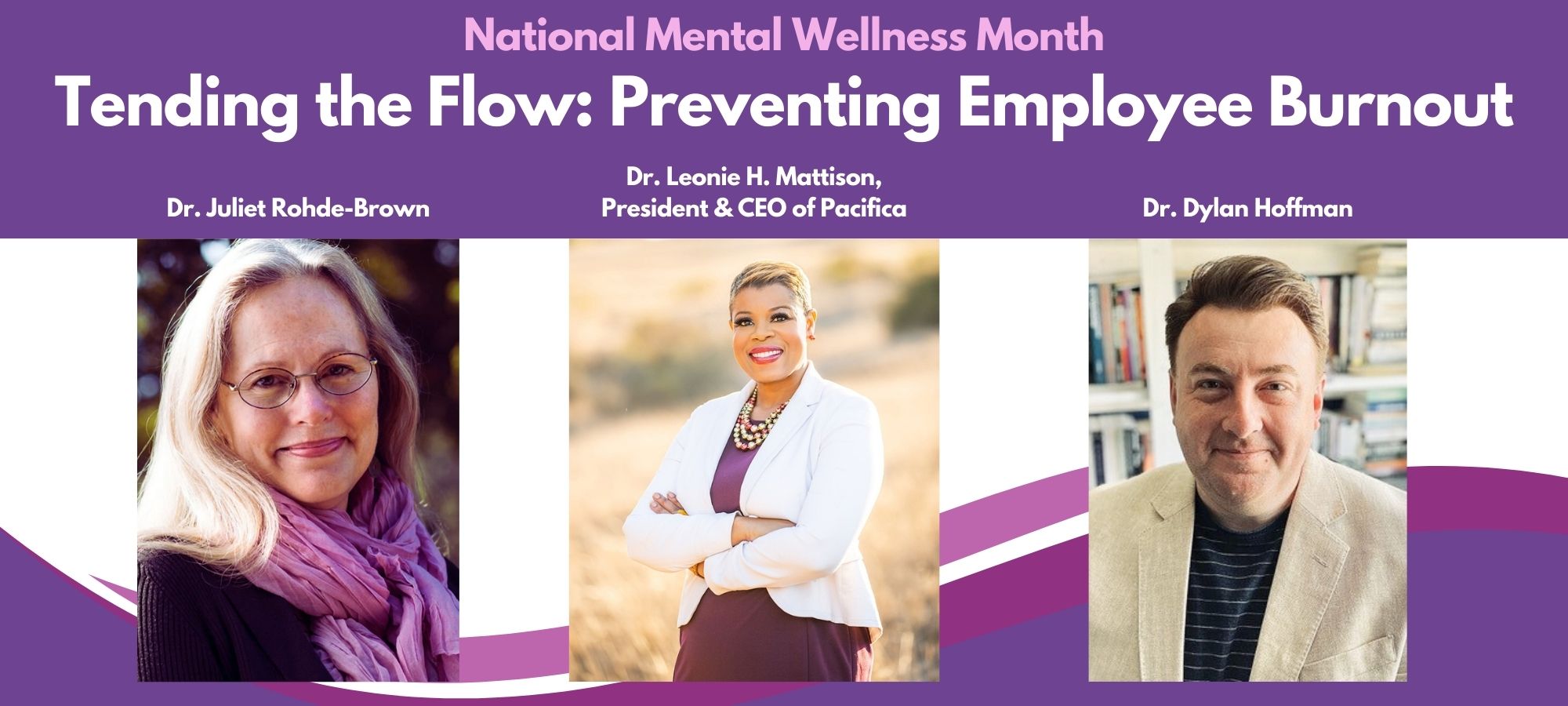Employee burnout is a universal issue not only external to Pacifica but within our community. It highlights our responsibility as an institution to share our insights on the topic. January is Mental Wellness Month, and Dr. Leonie H. Mattison, President & CEO of Pacifica; Dr. Dylan Hoffman, Co-Chair of our Jungian Psychology and Archetypal Studies Program; and Dr. Juliet Rohde-Brown, Chair of the Integrative Therapy and Healing Practices Program, gathered to discuss this issue, which can have such a fundamental effect on mental wellness.
Dr. Lee: Employee burnout is a profound and important topic not only external to Pacifica but within our community. It highlights our responsibility as an institution to share our insights on the topic. We have been working on several key priorities over the last 14 months and I’ve been observing the archetypal energies at play in our professional lives. I’ve been considering which strategies, grounded in depth psychology, we’ve used in the past, are using today, or should explore as we move beyond Covid19 and the environment we’re sharing to address burnout. I believe there is an urgent call to action. We need strategies grounded in depth psychology to create a more soulful workforce.
Dr. Hoffman: It’s a complex issue in itself because it involves things that are outside the control of Pacifica, like family support in the individual’s life. But within Pacifica, it’s implicit in our priorities. Burnout can stem from confusion over roles and responsibilities, from people not feeling rewarded for the work they’re doing, and it can come through feeling like you’re not able to fulfill the role that you have signed up for, because you’re being pulled in different directions. Part of what we’re doing is touching those different levels of what it means to feel like to inhabit a place of congruence with the vision of the institution; you’re inhabiting the task and feeling reward for it. When those align, burnout is less likely. It’s when one of those things goes awry that we begin to question if our time is well spent here. We’re doing that work right now.
Dr. Lee: Yes, it’s a work in progress. But what excites me about the archetypal forces is to share them with people. Some of the burnout I’ve observed is that we’re carrying all of it alone, going to the hero archetype. The hero wants attention, is advocating. We’re not leaning on each other in a soul way. I felt challenged by the topic, which means it’s a message from the soul. What is the opportunity? It’s time for all of us to engage in this conversation as a community and learn the language of working together, soul-to-soul. I feel we need a common language.
Dr. Rohde-Brown: It’s important to always consider that we’re multifaceted human beings who are all working together in a community that feels strongly about the bigger picture of this life on Earth. So I think we can benefit from owning the healer archetype, but what can get in the way of that are the shadow aspects of the healer and other archetypes: the savior, the power archetype. And others can project those onto other people or there can be an egoic identification with archetypal energy. How do we tune into ourselves and recognize we are not the projection, and all the while holding the healer archetype in its compassion, strength, and beauty? There are practices we can do. Active imagination with the dreams we have. The relational aspect is so important, getting to know each other as human beings rather than the projections we might put on each other. Coming together in a genuine, authentic way is so powerful. We have some real strengths here. Staff, students, and faculty come here for something unique. How do we recognize our growing edges while standing in that strength?
Dr. Hoffman: It might be valuable to think in terms of the flow of energy, like in a river system of tributaries and larger currents, and ask if the energy we’re carrying is flowing. I often think burnout is about energy being blocked rather than over-used. Frustration kicks in when energy is blocked. If I feel my energy is being diverted and diffused in ways that don’t feel meaningful, I lose the rationale for why I’m here, because I don’t feel like my energy is going in a meaningful direction. And the different parts of Pacifica need to flow into the whole. When things aren’t blocked up, I receive as much as I’m giving, and there’s less disruption in the river system. When each tributary (i.e., administration, faculty, staff, students) gets disconnected from the larger flow, then we ask what we’re doing and don’t feel in service to the deeper current of soul that we are here to serve. That’s when frustration, anger, and conflict come up. So, energy flow is my deepest language around this.
Read more in Part II of this interview.

At the helm of Pacifica Graduate Institute, Dr. Leonie H. Mattison (Dr. Lee) serves as President and CEO, guiding an institution defined by transformative education, research innovation, and culturally responsive care for the soul in the world—a mission she has upheld throughout her distinguished career. With leadership experience spanning higher education, non-profit, government, and the private sector, Dr. Lee has innovated organizational and talent development structures, overhauled learning institutions to enhance student access and employee engagement, and spearheaded national public health research and initiatives to improve health outcomes.
Inspired by depth psychological and spiritual approach to trauma recovery, she ingeniously fashioned the T.H.R.E.A.D. healing toolkit following a near-death stroke. The toolkit with its six step T.H.R.E.A.D framework—Think outcomes, Harvest lessons, Release pain, Enlist allies, Adopt a new mindset, Dream of a new self—serves as a transformative guide for self-discovery, healing, and personal growth. Infused with the essence of soulful well-being, it empowers individuals not only to recover but to thrive in life’s journey.
Dr. Mattison is an author, mother, and the first Black woman to lead an institution dedicated to depth psychological and psychodynamic domains. Her bold vision for Pacifica is to make depth psychology universally accessible. She consistently demonstrates her commitment to access, equity, and support for survivors to heal from trauma, invoking joy, faith, and resilience to fulfill her calling. An advocate for student success, women in leadership, and diversity in higher education, Dr. Lee embodies a commitment to caring for the world’s soul one individual at a time.

Juliet Rohde-Brown, Ph.D. is the Chair for the Depth Psychology: Integrative Therapy and Healing Practices doctoral specialization program at Pacifica Graduate Institute. She has been teaching psychology in higher education venues for over 20 years. Her clinical doctoral internship was completed at the C.G. Jung Institute of Los Angeles and she has worked clinically in private practice and hospital settings. Before becoming a licensed clinical psychologist, she did integrative work as a hypnotherapist and trained in neuropsychological assessment and in-patient settings, among others. She is a board member with the nonprofit organizations, Tierra Sagrada and Restorative Justice Resources and serves as a mentor with the Spiritual Paths Foundation. She has presented on psychological and interspiritual topics internationally, led and co-led retreats and workshops, and her book is entitled Imagine Forgiveness. Her peer reviewed journal articles have been featured in such publications as the Journal of Humanistic Psychology, the Journal of Divorce and Remarriage, Sutra – The Thread: Journal for Research on Education, Psychology, Traditional Sciences and Systems, Health and Consciousness and Psychological Perspectives, Journal of Jungian Scholarly Studies, and she has contributed book chapters to Probing the Boundaries Series: Vol. 172- Forgiveness: An interdisciplinary dialogue (Interdisciplinary Press), Humanistic Psychology and Diversity (Routledge), and “Like A Child Would Do”: A Multidisciplinary Approach to Childlikeness in Past and Current Societies (Universitas Press).

Dylan Hoffman, Ph.D., is core faculty and co-chair of the Jungian and Archetypal Studies specialization in the M.A./Ph.D. program in Depth Psychology at Pacifica Graduate Institute. His work focuses on C. G. Jung’s view of archetypes as the deepest energies of the psyche—how they interconnect spirit, psyche, and matter as numinous and mythic powers that animate, govern, and structure the cosmos as a whole. Dylan grounds his work in indigenous/shamanic and decolonial perspectives and practices that provide a primordial, holistic, and sacred worldview within which to understand the archetypal psyche, to embody its wholeness individually and relationally, and to live in service to an ensouled and enchanted world.


